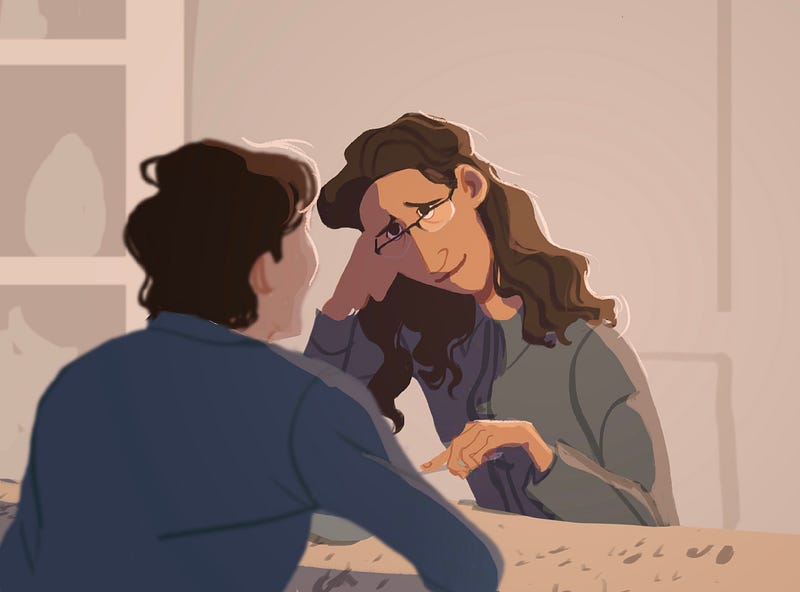More than Friends

The value, struggle and joy of a friendship.
Written by Sadie Fick
“You know that thing you sent me about soulmates the other day?” my friend asked halfway through dinner.
I did know. It was a free-writing piece I’d done as an activity for the writing club we were both in. It started with the sentence “Soulmates are terrifying.”
“Oh God, it’s actually happening,” I thought.
“What if you live in the same town as your soulmate your whole life?” I’d written. “They might be the person who checks you out at the gas station or teaches in the same school but all the way across the building and you never interact in any significant way … so you go your whole life without ever knowing?”
He took a breath. “Were you thinking about anything specific when you sent me that?”
My heart dropped.
The line between friendship and a romantic relationship is hard to find. The phrase “more than friends” is often used to describe relationships that cross the line.
I’m on the asexual and aromantic spectrum, so the feelings used as clues about whether I want to date someone or be their friend are rather elusive. But navigating relationships that could be either platonic or romantic is hard, regardless of orientation.
Society says romantic relationships are more valuable and deeper than platonic ones. However, platonic relationships, particularly queerplatonic relationships, relationships that blur the typical lines between romantic and platonic, can be a source of support and joy just as much as romantic ones.
“Were you thinking about anything specific when you sent me that?”
No, I wasn’t.
I wanted to like him like that. He handmade me a Valentine’s Day card with doodles from the shows we’d watched. We could talk for hours, often ending up discussing politics, fears and other sources of existential dread — he calls it the “My-last-name, His-last-name Rule of Conversation.”
Still, if feelings don’t exist you can’t force them to.
In addition to mild yelling about soulmates, the free-write I sent my friend also contained musings about feeling pain, dream personas and wearing hats.
I turned the question around on him: “What were you thinking about it?”
“I don’t want to say it and ruin anything,” he said, looking anywhere except at me.
I’d been mildly panicking for months that he, my first and only friend at college, liked me and wouldn’t want me around if I didn’t like him back. Hearing that he didn’t want to ruin our friendship made me instantly feel less afraid.
He eventually choked out that he liked me. I told him he hadn’t ruined anything, that I’d think about it and that I really valued his friendship. Then we sat in awkward silence until getting up for ice cream, and the conversation moved on to other subjects — ice cream, health issues and food inequality.
Three years later, my friend told me rejection wasn’t the worst case scenario for him.
“My biggest fear was losing the friendship,” he said.
That night, our conversation eventually drifted back around to our relationship. He told me he felt seen, listened to and valued in this friendship unlike some previous ones.
“All in all, I think we’re going to be just fine and might even be better than we were before,” I wrote in my journal. “Even if I don’t feel exactly like he does, we both expressed how much we value this relationship and each other. Honesty and communication, right?”
Two years later, the two of us are planning on getting an apartment together for senior year.
I ask, “Just to be sure, you don’t have feelings for me anymore, right?”
Wrong. Oh boy.
He confessed he still had feelings for me and has been trying to figure out how to tell me. I came out to him as on the ace and aro spectrum. We both cried some. I was so thankful we still had plans to watch “The Haunting of Bly Manor” on Friday. We’d be okay.
When people who, hypothetically, could be attracted to each other are emotionally close, society tells us they should be together romantically — should be “more than friends.”
However, a relationship doesn’t have to be romantic to be more, like with a queerplatonic relationship. This term was created by the ace and aro community, but people of any orientation can have this sort of relationship.
To some degree, that could describe my friend and me. Last weekend I went to dinner with him and his parents while they were in town. We live together. I want to bring him home sometime and show him where I grew up.
Other definitions of a queerplatonic partner include “friends as important as lovers” or a non-romantic life partner.
We’re not that. But he is easily one of the best friends I’ve ever had, and that connection is a huge source of security and joy in my life.
We have spent hours watching and discussing shows together. We make sure the other person gets home safe when coming back from campus late. Last weekend, he sat with me while I cried and then made me dinner.
I’ll fight anyone who tells me that’s worth any less than a romantic relationship.
Related Coverage:
Long form Study — Love is a Many-Splendored Thing